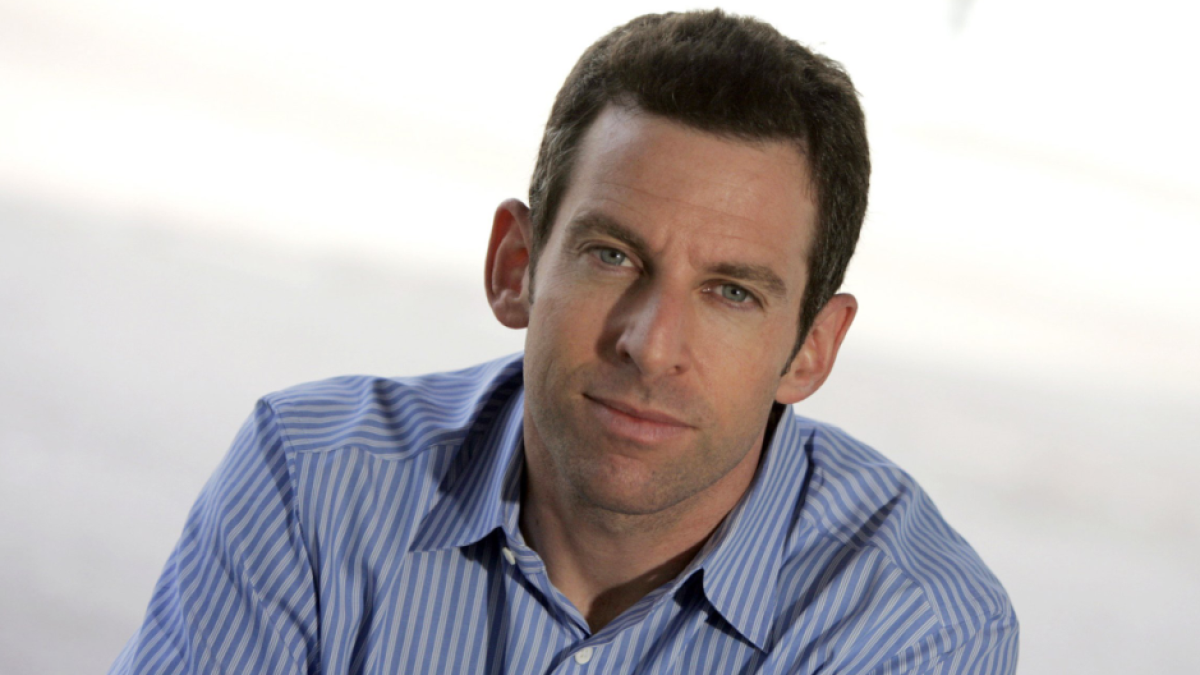Column: No God? No problem, says god-free thinker Sam Harris

Sam Harris isn’t quite the atheist provocateur that Christopher Hitchens was nor the militant that Richard Dawkins is. But he is building his place in the pantheon of god-free thinkers book by book. His latest is “Waking Up: A Guide to Spirituality Without Religion.” As a California native, he grew up with the Golden State’s alternative ideas. His own ideas — among them, that morality and spirituality can have a secular, scientific foundation rather than a religious one — are rooted in his UCLA neuroscience degree and his years’-long studies of meditation in places such as Tibet and India, including a brief gig on the security team for the Dalai Lama.
------------
FOR THE RECORD:
The Patt Morrison Asks column of Sept. 24 indicated that Sam Harris had studied in Tibet. He studied in Nepal. The quote from Harris’ book about plucking a diamond “from the esoteric dunghill of religion” should have read “from the dunghill of esoteric religion.” Instead of saying “the problem is not how to correct the lives of religious extremists” in one exchange, Harris said, “The problem is not how to correct the lies of religious extremists.”
------------
You write that you want this book to “pluck the diamond from the esoteric dunghill of religion.” What is the diamond of spirituality?
It’s the phenomenon of self-transcendence. Introspection is a domain of real discovery and consequential changes in your conscious life. Many people are uncomfortable with the term “spirituality,” and frankly I’m uncomfortable with it. I’m not the first atheist to use it somewhat defiantly. Christopher Hitchens and Carl Sagan didn’t use it quite the way I do, but they felt it was a word we had to reclaim and strip of its spooky associations.
What do people mean when they say, “I’m spiritual but not religious”?
Many things people mean by “spiritual” are every bit as incredible as religion. I divorce myself from the crazy claims about crystals and Atlantis and the things you find in the spiritual section of a bookstore.
The line between spirituality and religion for me really comes down to the former making claims about the nature of human consciousness and its possibilities, and the latter making claims about the nature of reality — the divine origin of certain books or the virgin birth or the way the world is going to end.
If you have an experience of unconditional love, that’s a spiritual experience; it tells you about the nature of human experience, about the potential of the human mind and human relationships, but it doesn’t tell you anything about the cosmos. You can value it and seek it out, but if you start making claims like “love pervades the universe,” then you’re just making spooky claims that by their very nature trespass upon the territory of physics and the rest of science.
Many people naturally conflate spiritual and religious feelings.
The problem is, everyone is living in the context of some religious indoctrination, so when they have these experiences, they count them as data in favor of religion. If you’re a Christian praying in church and you feel bliss, you’re going to start talking about the grace of God. If you’re a Hindu praying to Shiva, you’re going to have a very different interpretation for the same experience.
There are mental states that people from athletes to writers call “the zone” or “alpha state” that pass for spiritual experiences.
There are many activities where you can be totally at one with what you’re doing. It’s a respite from feeling we’re in our heads constantly, thinking. Once you have an experience like that, you tend to seek it out.
The difference between spirituality and those experiences is that you can inhabit that place as a matter of course. It’s no longer contingent on putting on your wetsuit and getting into the water, or writing for three hours on a lot of coffee.
Was it the drug Ecstasy that opened up spirituality for you?
It definitely was. I wouldn’t call that the true experience of self-transcendence that is the focus of the book, but it was profoundly liberating. It convinced me it was possible to have a much better life and be a much better person, and some action was required to figure out how to be more that way more of the time. It’s certainly something you can’t recommend without serious caveats.
Presumably you’d advise people to find legal ways to achieve liberation.
The idea that something like Ecstasy is illegal is a travesty. But some people you teach to meditate, nothing happens. They’re too distracted, too restless. Some are walled off from the fruits of introspection, and that’s a problem drugs solve to some degree. When I was 18, I had a very rich intellectual life, but I was not particularly introspective and already very skeptical. For someone as hardheaded as I was, I think Ecstasy was probably indispensable.
If spirituality can’t meet a scientific standard of being observed and measured and reproduced, is it real?
There’s a lot of confusion about what it means to make valid truth claims about reality in a scientific context. I can make an objective claim about my subjective experience that is unbiased, rational, based on logic and evidence. I can make an objective claim that’s likely to be true about your subjective experience; I can be reasonably sure that for the last five minutes, you haven’t been thinking a whole lot about World War II. You’d have to be a pretty heroic multi-tasker to make any headway on that topic while you’re having this conversation with me.
Many truths we can discover about consciousness change our lives in positive ways. Consciousness is the one thing in this universe that can’t be an illusion. This might [all] be a dream. You might be a brain in a vat. But the fact that you are having an experience at this moment is indisputable.
How has spirituality altered your life?
It allows me not to suffer unnecessarily, to cut off the process of suffering when I pay attention to how it’s arising. The effect on your life is impossible to exaggerate. There are moments when anger is useful, but how long do you want to stay angry? Being aware of that allows you to drop anger when it’s no longer serving you.
You write about separating spirituality from religion. You’ve also written about religion retreating in the face of science.
This has been a several centuries’ long story of religion losing ground to scientific and secular understanding.
We didn’t have a science of medicine. We had no idea why people got sick, so the good doctors of the church were the authorities. When bubonic plague was ravaging Europe, the church was cutting the tongues out of blasphemers, thinking blasphemy was the cause. People believed in the evil eye. This is what the human mind does in the absence of any real understanding of causes.
There have been a few areas where we haven’t made much [scientific] progress, the chief ones [being] morality and spirituality. Now I’m talking about how we can understand spirituality in the context of science and secular rationality.
What of claims that prayer can cure and calm the sick?
Those are two different claims. I have no doubt prayer can calm people.
[A] Templeton Foundation study found intercessory prayer just doesn’t work and is slightly counterproductive. It’s been obvious that the conditions for which prayer has been reported to work are self-limiting things that people tend to get better from anyway, or things like cancer where some people go into remission for reasons inscrutable. Nobody ever seriously expected prayer to work for the restoration of a missing limb. You can fill a stadium with pious people and put an amputee at the 50-yard-line and pray to your heart’s content, and nothing is going to happen.
Why can’t an omnipotent and omni-benevolent God accomplish this healing? Because he’s not there to accomplish it, is almost surely the answer.
The latest, distressing religion-related headlines are about violence by Islamic State, posing as believers.
They’re not posing as believers; they are true believers. They truly believe in the letter of the scripture. Everything we see ISIS doing is spelled out in the Koran and the Hadith.
The problem is not how to correct the lives of religious extremists; we have to figure out how to divorce Islam from its actual doctrines. Cutting off people’s heads is there in the Koran. If it said, “Cut off their legs,” we would see ISIS cutting off legs. This is paint-by-number Islam.
They’re not all psychopaths. These are normal people who believe startlingly crazy things in the context of their faith. We have to figure out how to undercut these beliefs in martyrdom and jihad, and that apostasy and blasphemy are killing offenses. These are about as uncontroversial under Islam as the resurrection is under Christianity, and that’s the problem.
Muslims are terrified that they’re going to be more stigmatized than they are. There are 1.6 billion Muslims. Some significant number don’t take their faith very seriously. Hundreds of millions have convictions we would find problematic — their view of women and Jews and free speech. When you ask British Muslims should the Danish cartoonist [who caricatured the prophet Muhammad] be thrown in prison, 78% said he should have been. That’s a huge problem.
You write that people fear and ignore death, or they deny it with religious beliefs in immortality. Is yours a third path?
It’s really about being at home in the present moment and being willing to experience whatever is happening. We need to learn equanimity with old age and death. That is not best achieved by lying to ourselves that death doesn’t happen, or doing our best to ignore it by distracting ourselves.
This interview has been condensed and edited.
Twitter: @pattmlatimes
More to Read
A cure for the common opinion
Get thought-provoking perspectives with our weekly newsletter.
You may occasionally receive promotional content from the Los Angeles Times.







